Live news as it happens at the first day of the inquiry at Blackpool Football Club into Cuadrilla’s fracking plans in the Fylde area of Lancashire. Check our summary page for more information, posts and links
4.58pm
Inquiry adjourns for the day. Day 2 opens at 9.30am.
Cuadrilla’s witness questioned on mineral planning policy
4.30pm
Ashley Bowes, barrister for Preston New Road Action Group, begins to cross-examine Cuadrilla’s planning witness, Mark Smith. He asks Mr Smith about local planning policy used by Lancashire County Council to refuse the company’s fracking plans.
Mr Bowes put it to Mr Smith that Cuadrilla’s proposals to frack at Preston New Road and Roseacre Wood did not comply with policy SP2 in the Fylde Local Plan.
Mr Smith said:
“All mineral development would be in breach of that policy because there is no reference in it to mineral development.”
Mr Bowes turned to local planning policy EP11, which says new development should be sited in keeping with distinct character types of Lancashire. He said the company’s plans were not in keeping with landscape character types and would conflict with that policy.
Mr Smith said:
“The strict interpretation of that policy would be yes, although … that policy is principally directed to new permanent build developments, not minerals.”
Mr Bowes turned to the a ministerial statement in September 2016 in which the government supported shale gas developments carried out in “a safe, sustainable and timely manner.”
Mr Bowes asked if an application would get support from the statement if it was unsustainable.
Mr Smith said:
“It is implicit in the statement that shale gas is sustainable because it is acknowledged as such in the statement.”
But he did accept that an application with adverse impacts would not comply with the National Planning Policy Framework.
Mr Smith added:
“If there was material harm and that was backed up by sound assessment and evaluation which found that there was harm then whatever the timescale that is a material consideration.”
Noise
3.50pm
Alan Evans, barrister for Lancashire County Council, questions Cuadrilla’s planning witness, Mark Smith.
Mr Evans put it to Mr Smith that the National Planning Policy Framework says people should expect to enjoy a good standard of amenity.
Mr Smith said it depended on how this was defined. He said:
“There is other guidance. There are other standards. There are limits that try to provide some definition of what is an acceptable noise standard in relation to quality of life.”
Mr Evans said the National Planning Policy Framework (NPPF) accepted that noise was unavoidable with minerals extraction if it were short term. Mr Evans asked Mr Smith if he believed the fracking applications were short term. Mr Smith said:
“My view is that they are temporary and there are a number of activities which are for a number of months. So they could fall within the definition of short-term.”
Mr Evans asked:
“14 months of drilling – is that the within the meaning of short term within the definition?”
Mr Smith said:
“Minerals are by nature temporary. Some are for a number of years, some are for 10 years are more, those activities are a number of months.”
He accepted that 14 months of drilling did not match activities, such as site road construction, maintenance and soil stripping, given as examples as short term in the national planning policy framework.
Mr Smith had said Lancashire’s local planning policy was out-of-date because it didn’t refer specifically to shale gas.
Mr Evans referred to policy EP27 which dealt with noise in the Fylde Local Plan.
“This is a policy directed at an impact. It is not to the point that it doesn’t take account of the development we have.”
Mr Smith replied: “That is correct”.
Mr Smith also agreed that policy EP27 was in line with the NPPF.
Cuadrilla estimated the cost of additional mitigation to meet noise limits of 37 decibels at Roseacre Wood and 39 at Preston New Road would be approximately £1.46M per exploration site.
Mr Evans said: “It looks quite a bit figure. We don’t have any context within the costs of the project.”
Mr Smith replied: “It is a considerable cost but that is one of the factors. Its cost, delay and operational risk and complexities of the site operation.”
Mr Evans asked: “How can the inspector make any judgement without any context to that figure?”
Mr Smith said: “It is a figure. It represents the cost and I acknowledge there isn’t a context but it is a significant sum of money.”
Mr Evans said: “We don’t know it is significant. You haven’t given us that information.”
Mr Smith: “I haven’t got that information”.
Mr Evans: “Have you asked?”
Mr Smith “It is something I was given. We were given the costs. That was the information I have.”
Sustainability
3.10pm
The inquiry hears from Mark Smith, planning witness for Cuadrilla. He is being cross-examined by Alan Evans, barrister for Lancashire County Council.
Mr Evans referred to a government statement from September 2015 in which the Energy and Climate Change Secretary, Amber Rudd, said shale gas should be carried out “in a safe, sustainable and timely way”. Mr Evans said the word “sustainable” engaged local planning considerations.
Mr Smith said:
“There is a planning process to go through and the statement does address some sustainability considerations. Gas is the cleanest of all fossil fuels so that is a sustainability consideration.”
Mr Evans put it to Mr Smith that policies in Lancashire’s local minerals and waste plan did refer to the benefits of an application.
Mr Smith said:
“It is not expressed in the same way as Amber Rudd’s shale gas and oil statement.”
But he agreed that there was a need to balance benefits and impacts.
Local planning policy
14.50
Alan Evans, barrister for Lancashire County Council, is cross-examining Mark Smith, witness for Cuadrilla on planning policy.
Mr Smith had said Lancashire’s policy was out-of-date because it had nothing to say on shale gas. He said:
“There have been opportunities for the authorities to update their polices. The PEDL licence has been in place since 2008. They have not taken the opportunity.”
Mr Evans said Lancashire’s minerals core strategy was adopted in 2009 and development management and site allocation was adopted in 2013. He said:
“In order to be adopted it would have had to have survived public examination and it would have been judged sound by an inspector. We can safely infer it was judged sound.”
Mr Smith said:
“There is a clear guidance now that plans are expected to include those policies and those policies are absent.”
But Mr Evans said there were present, relevant policy to judge the applications. The development plan was not absent, he said.
“You would not say there was not that appropriate body of policy in order to assess the applications.”
Mr Smith said:
“There are some relevant policies. We have assessed the applications against those policies.”
But Mr Smith added it was silent on meeting national need. “I don’t think it should be silent”, he said.
Cross examination on drilling rigs and flair stack
14.37
Alan Evans, for Lancashire County Council, begins to cross-examine Mark Smith.
Mr Evans asked Mr Smith to confirm that when the 50m drilling rig was not on site other tall structures would be needed, including a 36m workover rig. Mr Smith said: “I would have to come back to you on that”.
Mr Evans said there would also be a 10m flare stacks which would burn off gas during the early flow tests. He asked whether flames would be seen above the stack. Mr Smith said: “The intention is to use a flare which is enclosed so you will not see the flame”.
“No reason to refuse applications”
2pm
Inquiry resumes with Mark Smith giving evidence on planning policy for Cuadrilla.
Mr Smith said ministerial statements in September 2015 made it clear that shale gas was a key requirement if the UK were to successfully transition to a low carbon economy. Shale gas could create a bridge while the UK developed renewable energy sources.
He said the statements made clear that the carbon footprint from UK shale gas was likely to be significantly less than unabated coal and lower than imported liquified natural gas.
He argued that policies used by Lancashire County Council to refuse the applications were out-of-date or did not deal with shale gas. He quoted Paragraph 14 of the National Planning Policy Framework. This said:
“Where the development plan is absent, silent or relevant policies are out-of-date, granting permission unless: – any adverse impacts of doing so would significantly and demonstrably outweigh the benefits, when assessed against the policies in this Framework taken as a whole; or – specific policies in this Framework indicate development should be restricted.”
Mr Smith said there were no valid planning reasons for refusing all four appeals.
“There is no policy guidance that these appeals should be dismissed or the applications restricted through conditions.”
H# said there was no evidence that the Preston New Road site would lead to urbanisation of the countryside or create unacceptable noise levels.
On Roseacre Wood, he said the transport impacts from the site would not be severe so there was no conflict with planning policy.
Addressing public health concerns, he said Public Health England had concluded that the risk to public health from the fracking sites would be low if they were properly run and regulated.
On waste, Mr Smith said the Environment Agency had been satisfied that there was currently adequate capacity in the UK to treat waste generated by the fracking sites.
Inquiry breaks for lunch
13.05
First Cuadrilla witness: Mark Smith
12.30
Cuadrilla’s first witness, Mark Smith of Arup, gives evidence on planning issues. The inquiry hears he prepared the planning statement on the applications and was involved in consultation activities.
He said Lancashire County Council officers concluded that environmental impacts could be mitigated with conditions, apart from traffic at Roseacre Wood.
Mr Smith said the first well would take 5 months to drill, later wells 3 months. Fracking would last for 2 months and flow testing, where gas was flared, 3 months. The extended flow test would last 18-24 months. Mr Smith said this was an indicative programme. During the extended flow test the rig and flare would not be needed and gas would piped directly into the main.
On the monitoring schemes, only a man-hole type cover would be visible above ground, he said.
Preston New Road Action Group opening statement
12.22
Ashley Bowes, of Preston New Road Action Group, makes his opening statement. He argues that the Preston New Road exploration application failed to respect the positive features of landscape. It conflicted with the local development plan because it was industrial development in open countryside.
The scheme would also have harmful impacts on local people, h said. It was no comfort to them that the application was temporary because they would be inconvenienced for a considerable period of time.
He said Cuadrilla had failed to take account of current noise conditions. He would argue that anything more than 30 dba night noise would have an impact on residents. He said more than the three people mentioned by Nathalie Lieven would be affected by the plans.
Cuadrilla’s reliance on the need for gas, stated in national policy, fell away because government ministers said shale gas developments had to be sustainable. “The appeal scheme cannot be sustainable because it conflicts with the development plan”, he said.
Roseacre Awareness Group opening statement
12.15
Robin Green, for Roseacre Awareness Group, makes his opening statement.
He said the fracking scheme, if approved, would be unlike anything local residents had been used to. Local roads were not suited to heavy goods vehicles, he said. People would face disruptive industrial development for five to six years. If it was proved to be economically viable, then Cuadrilla intended to move to extraction. He said:
“It would be naive that the county council could refuse that application”.
Mr Green said Cuadrilla had under-estimated the likely impact of the development at Roseacre Wood. It had ignore points raised by Roseacre Awareness Group, including issues on highway safety.
He said the company’s landscape assessment had not been objective nor developed using current best practice.
Many parts of the proposed route to the site were not suitable. The impacts on highway safety meant the application was in conflict with national planning policy because they would be severe and adverse. Proposed mitigation would not make the highway safe, he said.
Mr Green also said the company had failed to assess impacts of the Roseacre Wood scheme on local noise levels.
Government policy on the need to extract shale gas had exaggerated benefits and underplayed the costs, Mr Green said. It was not government policy to explore for shale in unsuitable areas. There was no need to explore for shale gas at Roseacre Wood.
Friends of the Earth opening statement
11.48
Inquiry resumes with the opening statement from Estelle Dehon, of Friends of the Earth.
She said the appeals should be refused because they did not comply with local and national planning policy, particularly on waste, climate change and public health impacts. She said:
“Broad government support for shale gas does not mean that these particular developments in these specific locations, concerning this type of extraction must be permitted.”
Ms Dehon said the inquiry was not limited to considering the reasons for refusal given by Lancashire County Council.
She said local policies DM2, CS5 and CS9 in the Lancashire Minerals and Waste core strategy and development plan required climate change, waste and public health to be considered.
Carbon emissions released from the proposed development could not be supported under the UK’s existing carbon budget or under obligations signed up to under the Paris climate agreement.
Ms Dehon said the volume of flowback fluid would also overwhelm UK capacity. She told the inspector:
“You must be satisfied that this issue is adequately addressed. There cannot be no assumption that this has been addressed because a waste permit was issued for the development. You, madam, have to be satisfied in planning terms that the waste will be satisfactorily disposed of.”
11.27
The inquiry takes a break until 11.45
Lancashire County Council opening statement
11.17
Alan Evans, barrister for Lancashire County Council, begins his opening statement.
Refusal of Preston New Road applications were against officers’ recommendation. This was local democracy in action, he said, to audience applause. The inquiry inspector asked people not to cheer or applaud.
He said the Preston New Road exploration application would result in adverse impacts on residents because of noise and visual intrusion. It was contrary to local planning policies DM2 Lancashire Minerals and Waste Local Plan and EP11 of the Fylde Local Plan.
On the Roseacre Wood exploration application, he said it would increase traffic and reduce highway safety.
Rally ends
11.15
Demonstration concludes outside Blackpool Football Club

North and Western Lancashire Chamber of Commerce opening statement
11.o7
Babs Murphy makes an opening statement for North and Western Lancashire Chamber of Commerce. She said insufficient weight had been given to the financial benefits of exploration and extraction by Lancashire County Council. She said:
“Had appropriate weight been given to local and national policy we believe the balance would have swung in favour of granting planning permission”.
She said the county council has demonstrated a lack of political will and had been subjected to intense pressure of environmental pressure groups parachuted in to the area. She added:
“These applications are the leading edge of this new industry. If they are refused there is a significant risk that industry will lose interest because the political environment will be overtly hostile” (cheers for the audience)
The industry is poised to invest and maximise the opportunity for the county, she said. Shale gas should be a strategic industry but that would happen only if applications were approved.
Cuadrilla opening statement
10.46
Opening statements begin with Cuadrilla’s barrister, Nathalie Lieven.
She said the appeals should be allowed. There was a national need and they complied with national policy. She said:
“The government supports the extraction of shale gas and there is a national need for the applications before you. It is not for this inquiry to go behind these statements. The appellant believes these are not material issues for the inquiry, evidence will not assist you and we will not to call evidence beyond that national planning policy.”
She added that national policy required the local planning authority to rely on other regulatory regimes to act appropriately on issues such as flowback material and emissions .
She said the impacts had been overstated by opponents. Night time noise would effect only three properties at Preston New Road. She said:
“It is little short of astonishing that an application on a national need should be refused on on noise impact on three properties when mitigation measures accord with national policy.”
She said the council had been concerned about lorry movements to the Roseacre Wood site. But only on one stretch of road. The maximum number of lorry movements would be 50 a day for a period of 12 weeks over the entire length of the permission. She said:
“Lorries will not meet. There will be parking places. The appellant will have an arrangements for travelling through Inskip site.”
On landscape intrusion, she said there were no national or local landscape designations covering either Preston New Road or Roseacre Wood. The rigs would be in place for 14 months in total over the six year life of the permission.
The Preston New Road site was between the A583 and the M55 motorway and its proximity to the urban area was obvious, she said.
Concerns had been raised about health impacts arising from stress and fear about the application, she said. That was perfectly understandable. People will feel anxious. But people were anxious about the development of the railway in the 19th century.
The government had stated there was a national need for shale gas. The applications for exploration and Preston New Road and Roseacre Wood should be granted, along with the monitoring application at Preston New Road and conditions removed on the Roseacre Wood monitoring scheme.
Pro-fracking demo
10.40
About 75 supporters of fracking demonstrate outside the inquiry for about 40 minutes
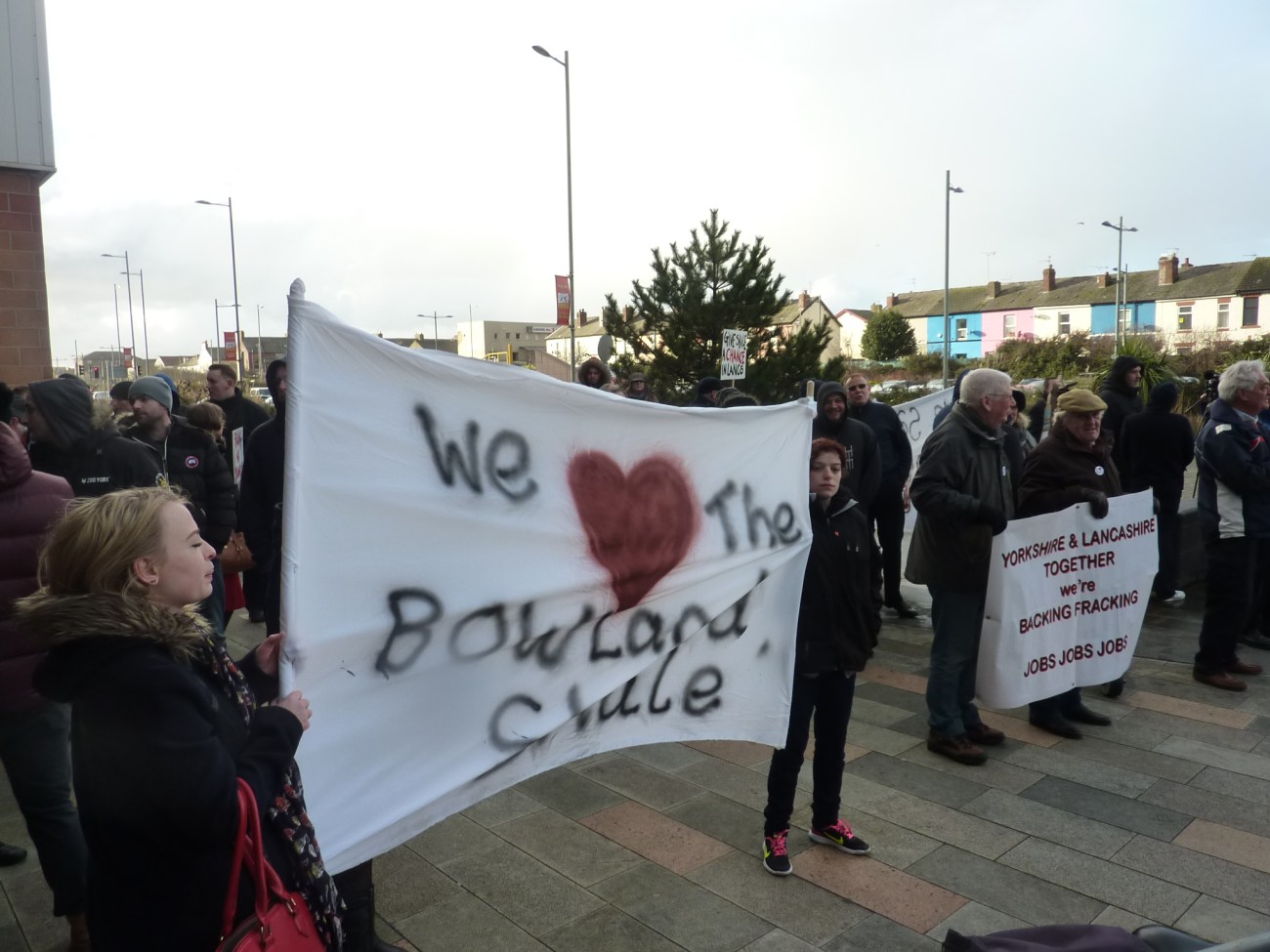
Inquiry timetable
10.30
The inquiry discusses the proposed timetable. Estelle Dehon, of Friends of the Earth, asks for her witnesses to be heard in a more concentrated block than is planned. She also warned that she would not be available for a sixth week.
Wendy McKay, the inspector, confirms the site visit to the proposed exploration sites at Preston New Road and Roseacre Wood would be on Wednesday 24th February. More details to be announced later. A second visit to the monitoring arrays that cannot be seen from the road will be needed, she said, possibly after the end of the inquiry. She will also be making visits at night.
Nathalie Lieven, for Cuadrilla, said both proposed exploration sites were covered by a High Court injunctions and a list of people going on the site visit was needed to avoid breaching the orders.
10.28
Wendy McKay says she will consider costs at the end of the inquiry. Cuadrilla’s barrister, Nathalie Lieven, said the company would be making an application for costs. None of the other parties said they would be applying.
10.25
Wendy McKay asks about draft conditions in the event that the appeals are allowed, but stresses this does not prejudice her recommendation to the Secretary of State. The barristers for Cuadrilla and the county council say they’re not quite ready to submit an agreed list.
Inquiry opens
10.03
Inquiry opens. Wendy McKay introduces appeal cases and barristers.

10.00
Inquiry inspector Wendy McKay takes her seat
Steve Holgate speech
9.45
County Councillor, Steve Holgate, tells opponents of fracking he is confident that the planning inspector will come to correct conclusion.
“Lancashire County Council listened to all evidence from all parties and concluded that fracking was not appropriate on these sites. I can’t see how a truly independent inspector can think anything other than that.”
He said a leaked ministerial letter showed that Greg Clark, who will make the final decision, had “colluded” with other ministers to state that they needed to push fracking through on local communities independent of evidence.
“If that is not pre-determination, I don’t know what is.”
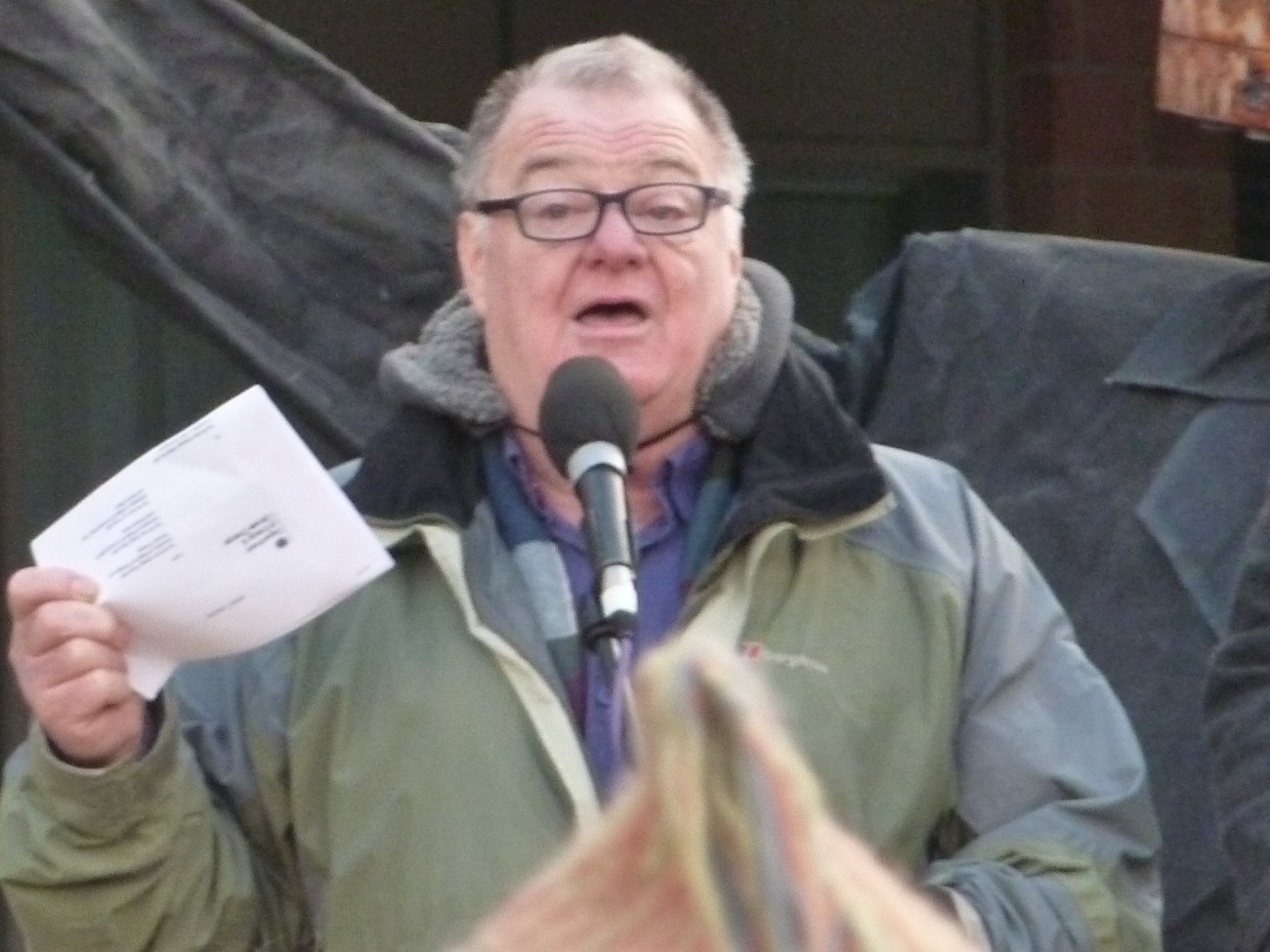
Inside the inquiry: documents
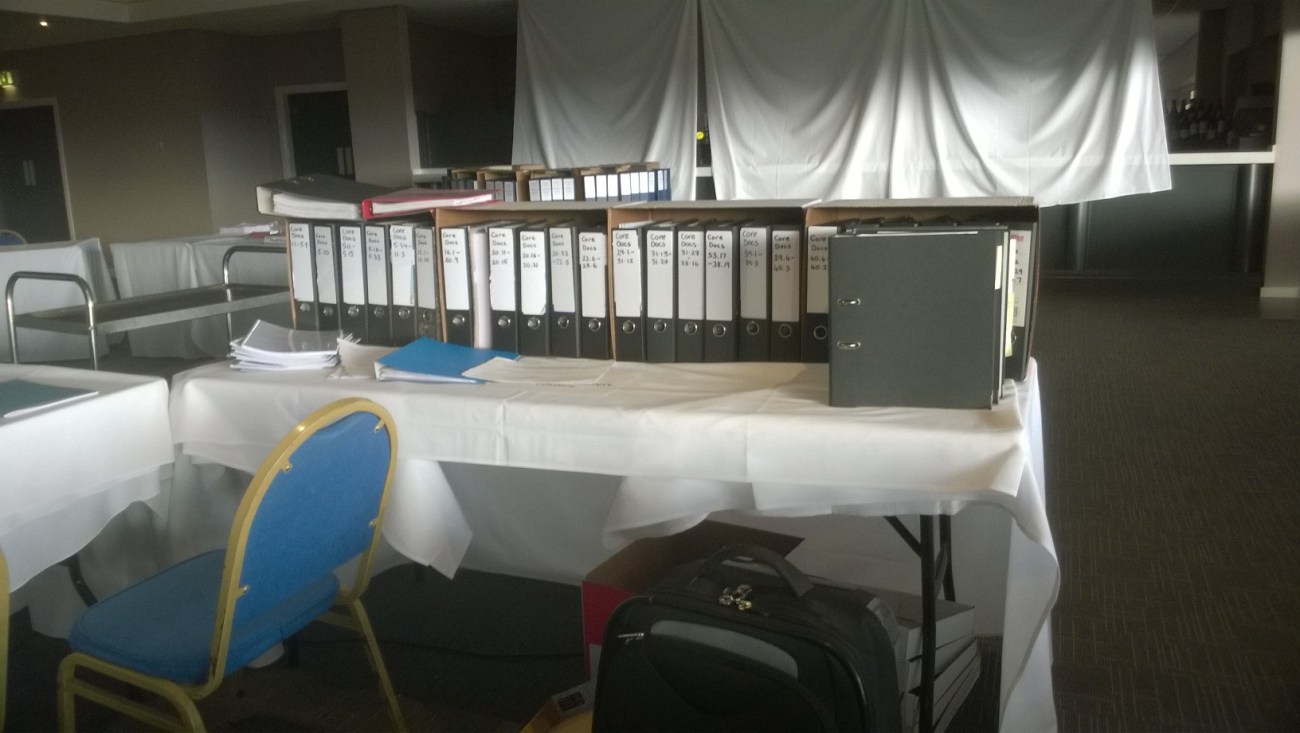
9.30
Speeches outside the inquiry. Friends of the Earth’s barrister, Estelle Dehon

9.15
Media arrives
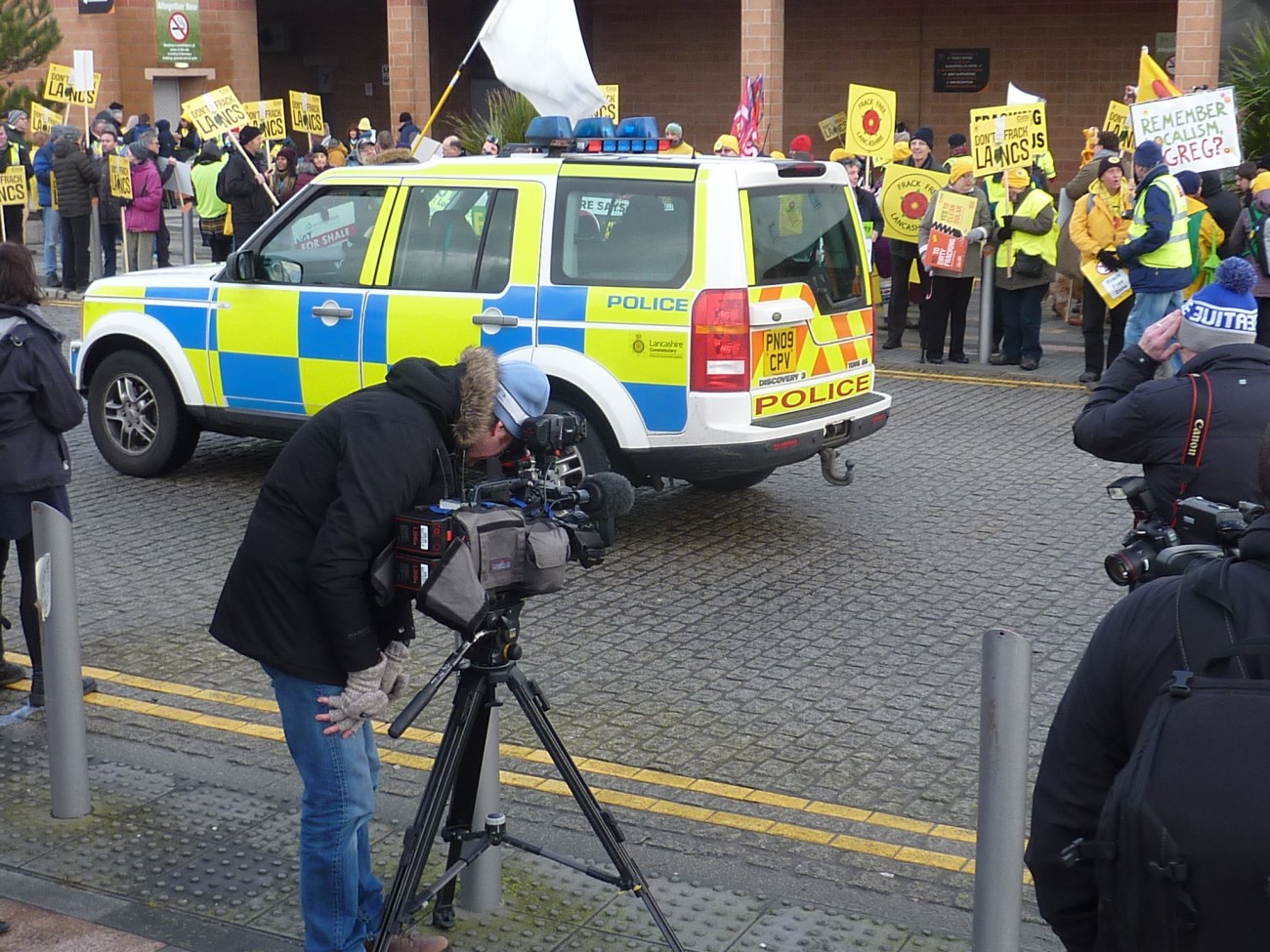
9.00
More anti-fracking campaigners arrive by bus

8.55
Lancashire nanas arrive
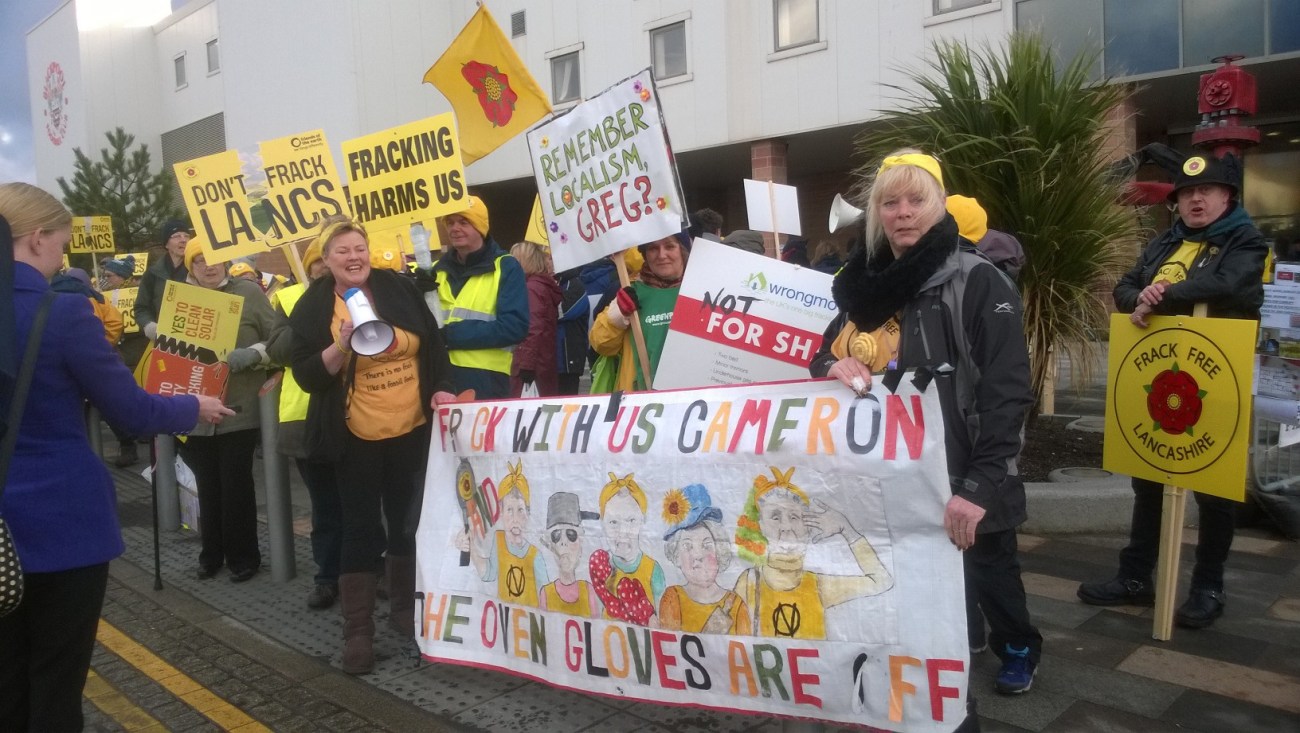
8.40
Anti-fracking campaigners gather outside the inquiry

Links here to all posts from the inquiry
This report is part of DrillOrDrop’s Rig Watch project. Rig Watch receives funding from the Joseph Rowntree Reform Trust. More details here
Categories: Regulation, Uncategorized

Bassetlaw Against Fracking sends its Support to all Lancashire groups opposing fracking in their county. We trust that the Lancashire police will be sending the gas company a £200,000 bill for police expenses involved with the eviction at Upton camp. Nowhere are anti-fracking is being violent and the gas companies are seeking to paint pictures of us all as terrorists of some kind. Do not let them. Keep calm. The scientific evidence speaks for itself against fracking.
Best wishes
David Larder
Chair: Bassetlaw Against Fracking
The only trouble with that comment David is that I know of many examples where the protesters have been. However, not all protesters are alike and many are peaceful, just let down by the odd few.
Well done Lancashire, great campaign and some brilliant questioning over the flaws in Cuadrillas application, as well as of the conflict between national policy framework directives and local mineral and waste policy and local council development plans.
Clearly much of what is proposed is ill thought through and poorly regulated or even thought of, including what size of drill, type of drill and appalling attitude to impacts as well as impacts long term. Calling this a short term initiative demonstrated the cavalier attitude of industrialists, and national government, as well as evidencing yet again why the regulatory regime is not fit for purpose and one of the worst in the world.
Laughed our socks off at the pro campaigners…are they bringing in a comedian next week, so funny……
Lancs Council were told that this wasn’t defendable and would put them at financial risk if it was appealed and it looks like we’re starting to see that already.
Mr Bowes put it to Mr Smith that Cuadrilla’s proposals to frack at Preston New Road and Roseacre Wood did not comply with policy SP2 in the Fylde Local Plan.
Mr Smith said
“All mineral development would be in breach of that policy because there is no reference in it to mineral development.”
Ouch.
Everybody knows that Fracking is desperate + toxic + damage to the environment is irreversible.
Go Lancashire you deserve to win to protect your Community + indeed the UK from being fracked to kingdom come!
We know what’s happened in Pennsylvania, Northern Germany + parts of Australia + Canada; the British Government should be ashamed of itself. Where is the democracy?
“If there was material harm and that was backed up by sound assessment and evaluation which formed that there was harm then whatever the timescale that is a material consideration.” said Mr Smith
There is material harm from saying this is a short term initiative when the Lancs plan says short term means only 8 weeks not two and a half years, so the barristers questions did raise serious flaws in Smith Cuadkillas opinionated interpretation of the national framework policy guidelines. Later in the day there was substantial demolishing of that same national framework when Mr Evans pointed out how its timescale was anachronistically woven into imperatives based upon imaginary time scales of local legislation conflicting with actuality at local level.
Most local governments are still giving out to public consultation there mineral and waste plans, yet the national framework insists they w ill devise a plan that makes exempt anything connected to shale gas after national government sending out missives to do so. This is unacceptable as it would open the door to any old sod coming in from over the Atlantic and completely wrecking planet England permanently if exemptions to locally agreed governance were wrecked in this cavalier way.
Thanks a lot Ruth Hayhurst for attending & noting the proceedings so carefully.
Your attention to detail & continuing efforts on behalf of the anti-fracking community are much respected & shared around the groups nationally & internationally.
It was heartening to see such a great turn out of local people at the enquiry too!
We are watching with bated breath from all over the UK because one drill in the ground will set a precedent that we will all have to live with & there is nowhere in these Wise Isles that wants to take the risk – especially bearing in mind the extreme cuts that all our regulatory bodies have recently experienced.
This enquiry may be long & tedious but that is nothing in comparison with the risk of permanent damage to the environment & the health of the nation.
Many thanks Ruth Hayhurst for your careful account of today’s proceedings in Blackpool.
We are watching & sharing all over the world with bated breath.
We don’t want to see Cuadrilla set a precedent & begin the frack attack on the UK!
Wonderful to see such a great turn out of anti-fracking supporters too!
Health should always come before wealth & the risks associated with the fossil fuel industry just cannot be underestimated, no matter how much our government would wish otherwise.
Can we have an update today please on how many pro frackers there are, as the Guardian reported only 20, and are they all granted free Band B at Rain Farm who I believe phoned me to ask about a now deceased relative to see if she still wanted BandB there……………strange people……………………
Whoops my son tells me that band b name might not be right re phoning about deceased relative he hasn’t got info back yet about the tel number location…..sorry for wrong location….
Well done Lancashire, loved the double decker bus.
So the myth of the many is put to rest – I can imagine the industry supporters comments on here if only 75 had turned up from the opposition campaign. Perhaps now they will stop their tedious comments on dwindling support etc etc. 75 and 40 minutes is underwhelming by any standards!